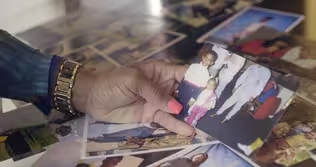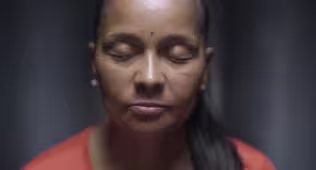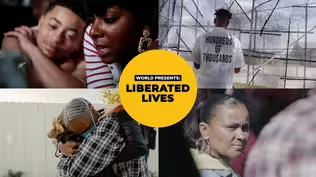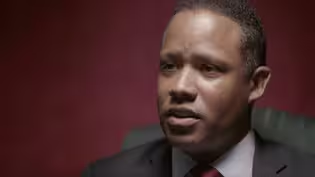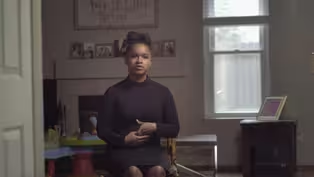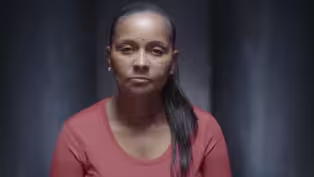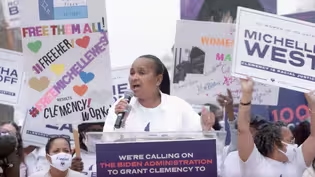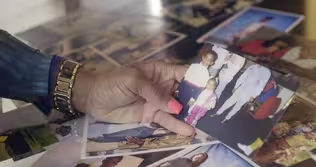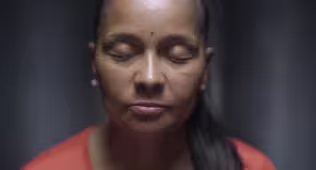
Beyond the Lens: Commuted | Nailah Jefferson, Darcy McKinnon and Danielle Metz
Clip: Season 16 Episode 1 | 4m 13sVideo has Closed Captions
A conversation with COMMUTED's Nailah Jefferson, Darcy McKinnon and Danielle Metz.
Filmmakers Nailah Jefferson (director), Darcy McKinnon (producer) and Danielle Metz (co-producer) talk about COMMUTED and their experience making the documentary. While Jefferson and McKinnon discuss the cruelty of the criminal justice system, Metz shares her intimate journey as a Black woman who was once incarcerated and is now advocating for others like herself.
Problems playing video? | Closed Captioning Feedback
Problems playing video? | Closed Captioning Feedback
Funding for AfroPoP: The Ultimate Cultural Exchange provided by the Corporation for Public Broadcasting and the John D. and Catherine T. MacArthur Foundation. Funding for America ReFramed provided by the...

Beyond the Lens: Commuted | Nailah Jefferson, Darcy McKinnon and Danielle Metz
Clip: Season 16 Episode 1 | 4m 13sVideo has Closed Captions
Filmmakers Nailah Jefferson (director), Darcy McKinnon (producer) and Danielle Metz (co-producer) talk about COMMUTED and their experience making the documentary. While Jefferson and McKinnon discuss the cruelty of the criminal justice system, Metz shares her intimate journey as a Black woman who was once incarcerated and is now advocating for others like herself.
Problems playing video? | Closed Captioning Feedback
How to Watch AfroPoP: The Ultimate Cultural Exchange
AfroPoP: The Ultimate Cultural Exchange is available to stream on pbs.org and the free PBS App, available on iPhone, Apple TV, Android TV, Android smartphones, Amazon Fire TV, Amazon Fire Tablet, Roku, Samsung Smart TV, and Vizio.
Providing Support for PBS.org
Learn Moreabout PBS online sponsorshipMETZ: It was just going back into a place that I really wanted to forget.
But I had to dig inside of myself to be as transparent as I could be.
I had never saw my mom cry before.
And my mom was, like, "I don't think you know "what just happened to you.
(echoing): "Do you know you have life?
(woman laughing, film reel clicking) Do you know what that means?"
WOMAN (on recording): This call is from a federal prison.
We wanted to make the film about a woman who made a choice and the repercussions of that choice.
LEWIS: Danielle Metz was sentenced to three lifes plus 20 years.
She's a first-time nonviolent offender.
JEFFERSON: It's very much about facing these injustices, facing the wrongs that were done to you.
And then when you get a second chance, what do you do with it?
This is a personal film, it's a lyrical film, it's poetic.
It's emotional.
METZ: I had been in prison so long, I'm, like, I just want to throw that in the sea of forgetfulness and just, you know, like, move on with my life.
But that would always be a part of my life.
With me expressing the pain and revisiting it, I begin to heal from it.
JEFFERSON: I knew that we wanted to approach the storytelling in a way that hadn't been before.
And we owe Danielle that.
And when we think about the large conversations that we have about prison reform, it's often men, Black men, that we see, and it is women like Danielle and those women that she was imprisoned with, those stories get lost.
There's...
This dehumanization that, that Danielle is speaking to allows for sweeping, sweeping sentences that are insurmountable lengths of time to be granted to people, without a real consideration of what that means.
And in Danielle's case, the jury was given erroneous sentencing recommendations.
METZ: Missing everything of your kids' life.
How am I gonna get out this place?
If you've been out of somebody's life 23 years, that's how long it probably take to get things back to normal.
Louisiana had the highest rate of incarceration and the highest rate of wrongly convicted.
It's never gonna end.
What are we doing?
What are we doing?
We only bringing more damage and harm to society.
I didn't ever want to lose hope, so I always kept thinking about my children, and, like, "I have to make it back."
It makes people feel hopeless, and when you're steady, telling them that they're worth nothing, they're never going to get out, this is all their life gonna come to.
When I first came through the door, it felt different.
It was very hard, but...
When I came home, and I would see this glitter in my mom's eyes, and she was just happy to see me walk through the house.
It's still hard, but I'm still trying to connect every day.
You know, some days, it's not a good day.
And when I come off my trips, my son, I tell him, sometime I just want to get in his arms and cry like a little baby.
And he said, "What happened?"
I said, "Well, I went out here and this happened or that happened."
But he was, like, "You're okay."
He said, "Sometimes you just have to, you know, breathe.
Breathe."
JEFFERSON: Our audience is the incarcerated, the formerly incarcerated, the family and loved ones of those who are incarcerated.
I feel like Danielle's an extraordinary person.
And so all the things that she has achieved since coming home, I think it will just help up, uplift people and to think about what they can do upon their return, or what their family member can do, or how they can help navigate them through their transition into the free world.
And so I hope this film speaks to them and lets them know that they're not forgotten, and that their voice and their story doesn't need to be boxed into one, one style of filmmaking or one style of, of storytelling.
METZ: I'm so grateful.
You don't know how grateful I really am.
I can't even put it into words.
And hopefully, we can start changing these things about, you know, around incarceration.
The sky is the limit for me, and that's where I'm going.
I'm trying to break the ceiling now.
Commuted | A Commutation, A Second Chance
Video has Closed Captions
Clip: S16 Ep1 | 59s | Kenneth Polite, Jr. shares why he supported President Obama's clemency of Danielle Metz. (59s)
Commuted | A Daughter Without Her Mother
Video has Closed Captions
Clip: S16 Ep1 | 47s | A daughter opens up about growing up very young without her mother who was incarcerated. (47s)
Video has Closed Captions
Clip: S16 Ep1 | 18s | Danielle Metz, a mother of two, tells her story of incarceration and separation. (18s)
Video has Closed Captions
Clip: S16 Ep1 | 53s | Danielle Metz speaks at a Free Her campaign, calling for clemency of incarcerated women. (53s)
Video has Closed Captions
Preview: S16 Ep1 | 30s | After Danielle Metz’s commutation, she gets a rare chance to regain her life and family. (30s)
Video has Closed Captions
Preview: S16 Ep1 | 1m | After Danielle Metz’s commutation, she gets a rare chance to regain her life and family. (1m)
Providing Support for PBS.org
Learn Moreabout PBS online sponsorshipSupport for PBS provided by:
Funding for AfroPoP: The Ultimate Cultural Exchange provided by the Corporation for Public Broadcasting and the John D. and Catherine T. MacArthur Foundation. Funding for America ReFramed provided by the...
